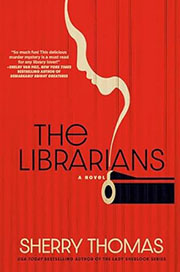
| Mon
Book Info
Subscribe
| |||
Dear Reader, It's time to finish your entry for this year's Write a DearReader Contest. Don't miss the deadline. All the information you need, including cash prizes (for you and your library), guidelines and past winning entries are here. Me, myself and I. When I spend too much time alone--it's not a good thing. That's one of the reasons I'm keeping my dinner date this evening. A friend called a few days ago, we made a date for dinner and ever since then, part of me has been trying to come up with reasons for why I should call her back and cancel. It's a very weird thing. Initially when I accept an invitation my adrenaline gets a little push and it feels good thinking about doing something different. I'm sure I'll have a great time, looking forward to the date, and even thinking about what I'll wear. But the closer it gets to the day of the event, the more "unsure" I feel. And that uncertainty continues right up to the time I'm getting dressed to leave--even then--I'm wishing more than ever that I hadn't accepted the invitation. 'Why did I say I'd do this? I wish I could just put on my pajamas and stay home.' Moan and groan--regrets about accepting overwhelm me. But by then it's too late to cancel and it's a good thing, too, because as soon as I say hello to my friend this evening, my feelings will change. And that's when the mystery gets even more bizarre, because in the middle of our dinner it will dawn on me how much fun I'm having and I'll be chastising myself, 'Suzanne, you really ought to do this more often.' Me, myself and I. We're a strange bunch; thank heavens people invite us out now and then. Thanks for reading with me. It's so good to read with friends. Suzanne Beecher P. S. This week we're giving away 10 copies of the book The Librarians: A Novel by Sherry Thomas. Click here to enter for your chance to win. | |||
The Librarians: A Novel | |||
CCTV footage in real life is not always black-and-white or grainy— this one has medium resolution and somewhat desaturated colors. Viewing the footage, it's easy enough to make out that the man sports a light blue Oxford shirt, open at the collar, sleeves rolled up. With his slightly long hair held back from the forehead by a pair of bronze-tinted sunglasses, he looks like a young Hugh Grant, someone who has enough charm, talent, and privilege to survive a hooker scandal with his career intact. He strolls along the stacks, occasionally crouching down to examine a row of books on the bottom. Several times he pulls out a volume, flips through it, then opens it until the front and back covers almost touch—as if to test the binding. The next day's footage is even longer, fifteen uninterrupted minutes of Kit Asquith wandering about the library. What was he doing? And did he know then that in less than three weeks he would be dead? In the final recording, Kit Asquith enters the library with a cardboard box. It looks heavy. He disappears from frame for a few minutes. When he reappears, he is still holding the same box. Again he strolls the stacks, sometimes taking down a book to drop into the box, sometimes putting one from the box up onto the shelves. After ten minutes of this, he leaves—never to be seen on these premises again. Maybe it's for the best that no one can figure out what Kit Asquith did in the suburbs of Austin, Texas—or where he hid the twenty-five million dollars he stole. Late-stage capitalism is the golden age of fraud, and financial crimes are thick on the ground. In a year Kit Asquith will become a footnote. In five years he won't even merit an ancillary remark. Provided, that is, his widow stays far, far away from this insignificant little library. CHAPTER ONE Austin, Texas Monday, two days before Halloween In the fortunate places of the world, libraries are everywhere to be found. Some are architectural marvels. Some are touchstones of civilization. Some awe by the depth and granularity of their seemingly infinite collections. But the greater wonder is perhaps not the phenomenal libraries proudly associated with illustrious universities or storied seats of power. The greater wonder lies in the ordinary ones, the ones that in the fortunate places are everywhere to be found. They exist and serve quietly, standing apart not at all from their unexceptional surroundings. Sometimes they are squeezed into tight corners; sometimes they share walls with grocery stores and sellers of electronic cigarettes. There is rarely anything unique or unforgettable about their collections, humble aggregates of popular novels, standard reference volumes, how-to books, and DVDs for those who don't yet stream all their audiovisual entertainment. Yet their ubiquity is their most fundamental virtue. Their unremarkable holdings would have dazzled scholars from the Age of Enlightenment. And as much as anything, they represent a community's investment in its members, a commitment to care for and nourish hearts and minds. Or libraries can be merely another place to work, another place of mundane chores, minor dramas, and mediocre compensation. 'I have become a pessimist', thinks Hazel Lee. Or perhaps she has long been a fatalist in an optimist's athleisure, her acceptance of the inexorable sweep of fate and entropy masked by her willingness to put some effort into the here and now. Her grandmother wanted her to take a position with the library system and Hazel acquiesced. But she didn't think she would be assigned to this particular branch. Nainai, on the other hand, is delighted. "So close by. And you loved going there when you were a little girl." One should be wary of revisiting childhood icons. Epics she adored turn out to have undertones—and overtones—of sexism and colonialism. People she loved embody a large spectrum of human frailties. Places that occupied hallowed ground in her heart are demolished or become something else entirely, such as the old noodle shop that is now an establishment called The Furless Kitty, specializing in Brazilian waxing. The branch library too has changed. The current incarnation is a redbrick building, its aluminum roof covered with solar panels. Two hundred yards away, a highway meets a local thoroughfare, but a shopping center separates and shields the library from the intersection. On the library's large lot, much of which has been left unpaved, mature live oaks flourish and further foster a sense of comfortable seclusion. Pleasant. Not impressive, but pleasant. And Hazel is satisfied with pleasant. She parks her e-bike on the rack at the front of the library and hooks her helmet to her backpack. Nearer to the entrance stands a stack of a free regional weekly. She remembers the publication from decades ago and is happier than she thought she would be that it still exists. A hesitant question comes as she browses the latest issue's guidance on the upcoming off-year election. "Hi. Are you Hazel?" Hazel turns around; a young white woman in her late twenties waves. Other than the red streaks in her sandy hair, she looks a lot like a hobbit: round-faced, with pink cheeks and brown eyes. Hazel can see her dancing, in the exact dusty-rose sweater vest and long corduroy skirt she's wearing, at Bilbo Baggins's eleventy-first birthday party. In other words, absurdly cute. She smiles. "Yes, hi, I'm Hazel." They shake hands. The young woman, who speaks with a Scandinavian accent, introduces herself as Astrid, a librarian at the branch. "It's great to have you here," says Astrid, looking a little shy. "Let me open the place up and show you around." The library's two sets of automatic doors slide apart to reveal ten computer terminals set up for the public. To the left of the computer terminals are the stacks. To the right, the circulation area. An L-shaped children's department wraps around the circulation area on the farther side, making the latter feel like a snug island, the warm heart of the library. Behind the stacks, a long rectangular work gallery unspools with desks, chairs, and plenty of outlets set beneath a bank of wide windows. Outside the windows, thick vines on metal trellises form natural sunscreens. Beyond the work gallery, invisible from the front entrance, nestles a reading area. There are fewer magazines on the periodicals shelf now—the times have not been kind to print publications—and the spin racks of audio CDs are gone. But DVDs still take up half a wall and the collection of graphic novels has proliferated. Given that Halloween is right around the corner, there are a fair number of skeletons scattered around the library, mostly on posters that will be taken down on November first. But there is a fully articulated skeleton in the children's area, peering intently into a shelf of image-heavy compendiums on dinosaurs. Not far away, three chubby and friendly-looking ghosts cluster around a Brambly Hedge collection. Astrid has Hazel deposit her personal items in the librarians' office, sandwiched between the circulation area and the drive- through pickup at the very back. She helps Hazel turn on the public terminals and the checkout stations' computers, then introduces Hazel to Sophie, a striking Black woman in a perfectly fitted hunter green suit and sky-high heels, and a tall, bearded white man named Jonathan—Sophie is the branch administrator, Jonathan their program director. She also presents two other librarians, but Inez and Raj protest that they are only clerks, not real librarians. Hazel takes that to mean that they, like her, do not have an advanced degree in library and information science. Not everyone at an attorneys' office is a lawyer and not everyone on a flight crew is a pilot—Hazel, no information specialist, will shoulder relatively humble duties. "To the public we are all librarians," insists Astrid. "And you're one of us now, Hazel. You're going to love it here." Before Hazel left Nainai's house this morning, the venerable old lady said, "Go on. Start a new life for yourself." Except Hazel does not want a new life. She would simply like to have her old life back, that untroublesome existence she hadn't appreciated enough when she still drifted along its placid currents. She smiles at everyone. "Thank you. I'm delighted to be here." Astrid has done a lot of fantasy casting over the years, putting faces—mostly those of well-known actors—onto characters from her favorite books. Hazel, she is sure, would have been perfectly cast as a woman with whom a chance encounter alters the course of a protagonist's life. Or at least costs them sleep and focus for a good long while. She is beautiful—perfect forehead, wide-set eyes, complexion as smooth as fondant on a wedding cake. Yet it isn't her loveliness that instantly fascinates Astrid. Near the university campus where Astrid spent her undergraduate years, there was a lake that teemed with expensive properties along its shores. One was finished right as Astrid began her freshman year. (continued on Tuesday) Love this book? Share your review with the Publisher
| |||
| Mon Book Info | |||

